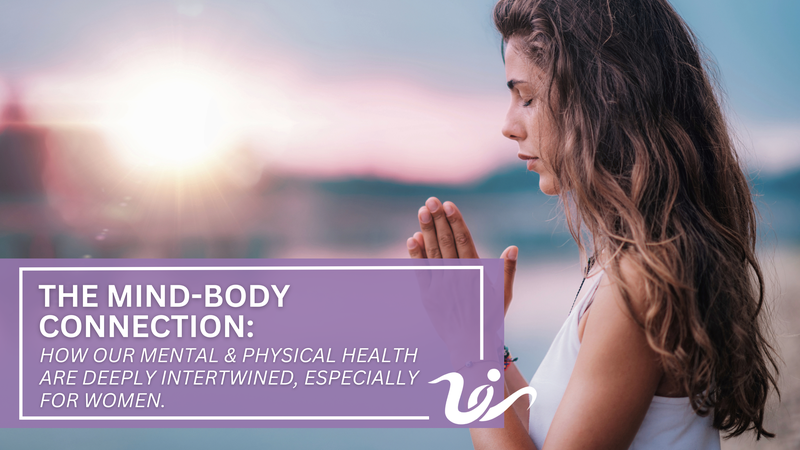In today’s fast-paced world, the significance of holistic health care has never been more crucial. As physical therapists who are dedicated to fostering both physical and mental wellness, we’ve witnessed firsthand how intertwined our mental and physical health truly are. The mind-body connection—a concept that has been recognized for centuries—suggests that our thoughts, feelings, beliefs, and attitudes can positively or negatively affect our biological functioning. Inversely, what we do with our physical body (what we eat, how much we exercise, even our posture) can impact our mental state.
This dual-pathway of communication between the mind and body offers a holistic approach to health, emphasizing the importance of caring for both our physical and mental well-being. Today, we’re delving deeper into how this connection plays a crucial role in women’s health, specifically focusing on mental well-being, recognizing and managing anxiety and depression, coping with perinatal mood and anxiety disorders, and implementing self-care strategies.
Self-Care Strategies Mental Well-being
Self-care is an essential aspect of maintaining both mental and physical health. It’s about doing things that refuel us, rather than deplete us. Especially for women, who often juggle multiple roles and face societal pressures, self-care is not just a luxury—it’s a necessity. Here are some self-care strategies that can support your mental well-being:
- Prioritize Physical Activity: Regular exercise is not only crucial for physical health but also has a profound impact on mental health by reducing anxiety, depression, and negative mood by improving self-esteem and cognitive function.
- Nutrition Matters: A balanced diet can affect mood and energy levels. Foods rich in omega-3 fatty acids, such as salmon, and those high in fiber can improve mental health.
- Quality Sleep: Prioritize getting enough sleep, as sleep deprivation can exacerbate mental health issues.
- Mindfulness and Relaxation Techniques: Practices such as yoga, meditation, and deep-breathing exercises can reduce stress and improve mental health.
- Social Connections: Maintaining a supportive network of friends and family can provide a sense of belonging and security.
Recognizing and Managing Anxiety and Depression
Anxiety and depression are among the most common mental health issues that we face today. Recognizing the signs of these conditions is the first step towards management and recovery:
– Symptoms to Watch For: These can include persistent sadness, fatigue, changes in appetite or sleep, irritability, and a lack of interest in activities once enjoyed.
– Seek Professional Help: Consulting a mental health professional or a physical therapist knowledgeable about the mind-body connection can provide strategies to manage symptoms.
– Physical Therapy and Exercise: Regular physical activity can be as effective as medication for mild to moderate depression and anxiety, without the side-effects.
Coping with Perinatal Mood and Anxiety Disorders
Perinatal mood and anxiety disorders (PMADs) affect a significant number of women during pregnancy and postpartum. Coping with PMADs requires understanding, support, and care:
- Education: Understanding that these conditions are common and treatable can alleviate a lot of the fear and stigma surrounding them.
- Support Systems: Lean on your partner, family, and friends. Joining a support group can also be incredibly helpful.
- Professional Guidance: Seeking help from healthcare providers who specialize in perinatal mental health is crucial for both the mother’s and the baby’s well-being.
Implementing a holistic approach to health care, where mental and physical health are equally prioritized, can significantly improve the quality of life. Remember, taking care of your mind is just as important as taking care of your body. As we continue to navigate the complexities of health and well-being, let’s commit to fostering a supportive environment that encourages the pursuit of both mental and physical wellness.


